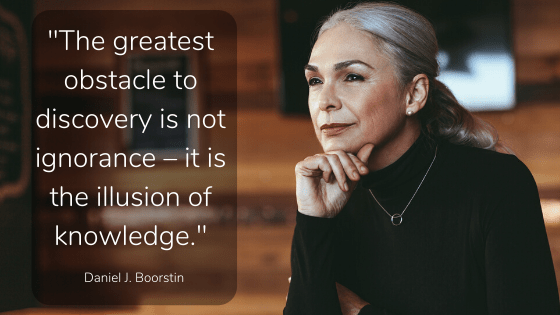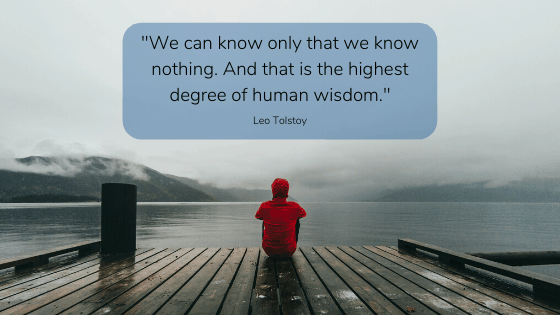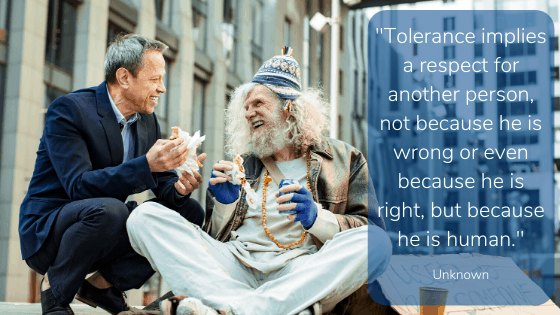After My Mormon Faith Transition: 9 Core Beliefs That Give My Life Meaning
Growing up within a very strong religious community, I was under the impression that a life without my religious beliefs would be dark and meaningless. This is a major reason why I was careful to avoid any evidence that might contradict my beliefs. I was scared of what life might be like on the other side.
Even though the transition from one system of belief to another can be extremely painful and difficult (See "Why I Almost Left the Mormon Church"), I’m happy to say that there's a light at the end of the tunnel. In fact, I'm finding that life after my faith transition is filled with more peace, assurance, and motivation than ever.
I don't “know” that my core beliefs are true, but I’m totally at peace with that, and I’m open to the idea that they will change over time. They are simply the beliefs that give me meaning and purpose right now. That’s enough for me.
I'm finding that life after my faith transition is filled with more peace, assurance, and motivation than ever.
Here are 9 core beliefs that give my life meaning after my Mormon faith transition:
- We Cannot Know Something Is True. There is no way to know whether our sensations are real or merely an illusion, good or evil, or right or wrong. We have not been given a consistent guide to knowing what is true in this life.

Growing up, I was told that if I prayed about something, I could feel that it is true. So, when I prayed to know if my church was true, and I felt good, I moved forward believing that I was on the one true path back to God. During my faith crisis, I discovered that some very-scary, cult-like groups1 and other mainstream religions relied on this same feeling-the-truth methodoloy:
I remember feeling something physically different about being in a Catholic church than any other church I had ever been in. I remember feeling warmth, comfort, peace, and calm wash over me as I would sit silently... I had felt an inexplicable physical difference between Catholic churches and Protestant churches - God’s grace had finally broken into my heart and I realized that the physical reaction I was having was Christ calling to me to Him in the Eucharist... I woke up one morning and knew that God was inviting me to become Catholic - I knew it like I know that I love my daughter. It was the most real, physical feeling I had on my heart and felt in my whole body – I can’t explain it any more than I knew with my entire being what God was asking of me.2
Now, don't get me wrong. I think it is very important to trust your feelings and listen to your heart. But, to suggest that these feelings are evidence for the truthfulness or superiority of one's belief system is taking things too far. After all, if people from many different faiths are citing this same feeling-the-truth methodology as evidence for their differing beliefs, they can't all be right (See "40+ Tactics Used by Controlling Groups").
Would a loving God really judge us based on our ability to both (1) discover this methodology, and (2) use it better than others to find the only true path back to Him? I'd rather not believe in a God that would test His children in such a way.

- We Must Choose What We Are Going to Believe. Because we haven't been given a methodology whereby we might know what is true, we must decide for ourselves what to believe.
While going through my faith crisis, I spent some time reading an intro-to-philosophy book, which really opened up my mind to some interesting ways of looking at life. I realized that almost any possibility for this life was valid ― even the possibility that everything I am experiencing is being put in front of my eyes by a devil, or even the possibility that everyone around me are actually robots (or even paid actors as in The Truman Show). Can these possibilities be disproven? No. We have to decide for ourselves what we are going to believe.
- I Choose Beliefs That Add Value to Life. I personally choose to believe in whatever adds value to life. If a belief isn't serving life, I will leave it behind.
Now, just because any possibility is valid doesn’t make it equally meaningful. Living as if everyone around me is a robot would likely lead to unfulfilling and meaningless relationships. I’d much rather believe that everyone around me has a similar internal experience. This adds value to my life and motivates me to develop relationships. So, I hold onto it. For me, I typically get value out of beliefs that are logical, practical, and simple (See "What I Believe Now After My Mormon Faith Crisis").
- Life Is Good. I believe that the core of every living thing is good (full of light, truth, and love).
One of the most important beliefs I’ve discovered after my faith transition is that the core of every living thing is good. This belief helps me view everyone around me as an equal and someone worthy of love. Even though we all make mistakes, I find value in believing that deep down we are all good people (See “How to Develop Unconditional Love: A Scientific Approach”).

- All Life Should Be Honored. The life in me, other people, other animals, other living creatures, Mother Earth, and Father Sky should be cherished, honored, and celebrated.
Cherishing, honoring, and celebrating myself and others really lifts me up. I also like the idea of reverencing the environment by personifying it with names such as Mother Earth and Father Sky. This planet is all we have, so I think it, above anything else we might consider worshipping, deserves our admiration, gratitude, and devotion. While I’m not actually bowing down and worshipping trees and mountains, I want to do what I can to take care of this planet to ensure it can continue providing the ingredients of life for millions of years to come.
- The Purpose of This Life is to Live to One's Fullest Potential. Just as a seed strives to reach its full potential as a tree, a human's purpose is to reach it's full potential as a human.
I find striving to be the best version of myself brings value to my life and the lives of those around me. I find this to be far more valuable than striving to follow a set of religious rules in order to qualify for some kind of afterlife. Once I gave up my absolute certainty of an afterlife, I felt super motivated to squeeze as much meaning out of this life as I can. Right now.
Once I gave up my absolute certainty of an afterlife, I felt super motivated to squeeze as much meaning out of this life as I can. Right now.
- A Human Will Reach Their Full Potential Given the Proper Environment. A seed will naturally, effectively, and effortlessly reach it's full potential when the proper environmental conditions exist to meet its needs. Similarly, a human will reach it's full potential if it is placed in an environment that meets its needs (See "30+ Human Needs: A Comprehensive List").
This belief helps me forgive others because it helps me realize that when they make a mistake, I really can’t blame them. They are not at fault for their environment:
When you plant lettuce, if it does not grow well, you don't blame the lettuce. You look into the reasons it is not doing well. It may need fertilizer, or more water, or less sun. You never blame the lettuce. Yet if we have problems with our friends or our family, we blame the other person. But if we know how to take care of them, they will grow well, like lettuce. Blaming has no positive effect at all, nor does trying to persuade using reason and arguments. That is my experience. No blame, no reasoning, no argument, just understanding. If you understand, and you show that you understand, you can love, and the situation will change.3
This belief helps me to be a more effective and loving parent when one of my kids does something I don’t like. Instead of blaming and punishing them, I try to think about how I can change their environment to be more conducive to better behavior (See "How to Build a Strong Family Culture: A Step-by-Step Guide").
- Every Human Has the Inborn Tools Needed to Thrive. Evolution prepared us with the inborn tools required to get our needs met (when we are placed in the proper environment). Such tools include our physical sensations, emotions, instincts, and more.
Growing up, I’d hear things like “The natural man is an enemy to God,” causing me to feel ashamed of my natural instincts and inclinations. Now I view my nature as normal, beautiful, and effective. Evolution carefully crafted my nature over millions and millions of years. I’m finding that when I pay attention to and honor my emotions and instincts, I’m able to find more meaning and happiness. I’m no longer ashamed of my natural human needs, but I am now seeking to meet them in healthy, beautiful ways.
- Thinking in Terms of Right vs. Wrong Does Not Add Value. One living thing may block the good from shining through another living thing, but that does not make either one wrong, bad, or evil. It simply means that they have temporarily competing needs.
Just because a bee’s natural instincts are to sting you when you get too close doesn’t make a bee evil or bad. It doesn’t even mean that it is "wrong" for that bee to sting you. The only reason you feel inclined to label it that way is because it goes against your own need for safety. Instead of viewing other people’s beliefs or actions as wrong, bad, or evil, I’m trying to look within myself and see what needs of mine aren’t currently being met.

Like I mentioned earlier, I don’t view these 9 core beliefs as bullet-proof, absolute, eternal truths. They are simply beliefs that supply me with the motivation to live a happy life from day to day. The beliefs that supply you with that motivation may be completely different, and that’s totally fine. Whatever you choose to believe, I hope it is helping you conquer your fears and find the motivation you need to live to your fullest potential.
Hi fellow human! Thanks for visiting my personal blog. I’m an intentional family man who is currently passionate about parenting, family culture, homeschooling, and self improvement. This blog isn’t a business. It’s just my way of connecting with people with just as much passion for these topics as me. So, if you enjoy my musings, be sure to reach out.
- "The Seven Signs You're in a Cult" by Boze Herrington
- "Conversion Stories" by Why I'm Catholic
- Thich Nhat Hanh

